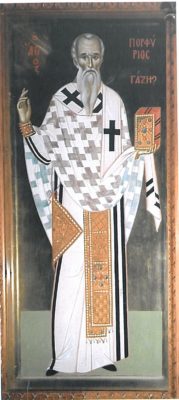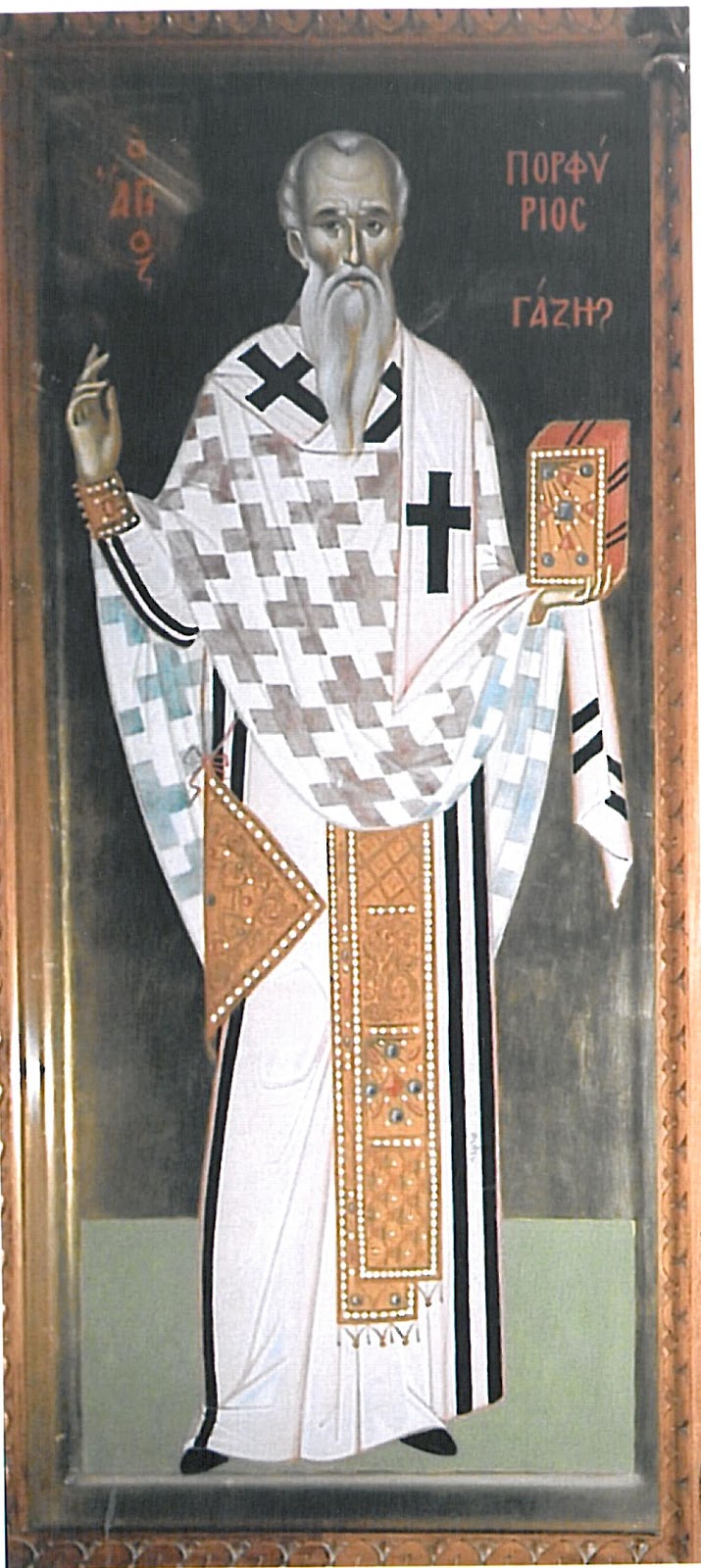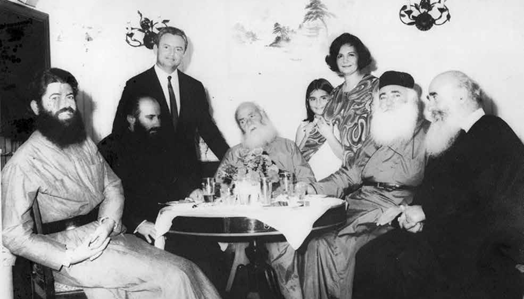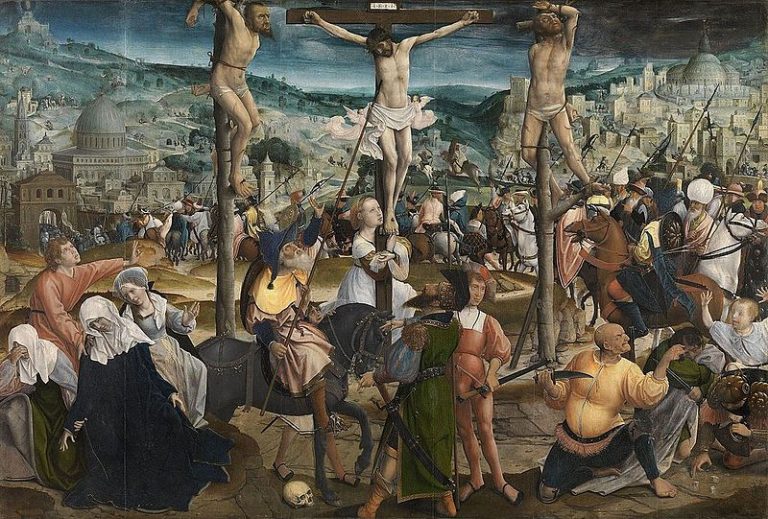The Bishop of Gaza Saint Porphyry the Missionary
Porphyrios, born and bred in Thessaloniki, came into the world in 347 AD. His noble and wealthy parents certainly made sure that their first-born offspring received a remarkable education. Obedient to the heavenly calling, the lad, at the age of twenty-five, abandoned his comfortable life and worldly career, departing for the desert of Egypt, the spiritual university of life in Christ. He had to be transferred, however, because of illness, to Jerusalem, where he lived an intense liturgical life. In the theocratic city, Porphyry was ordained an elder and merited to serve for three years as a guardian of the Holy Cross. When he reached the age of 45, he was elevated by the Bishop of Caesarea to the highest rank of the priesthood and placed on the episcopal throne of Gaza. Gaza was a great and historic city. Rich and commercial. It was flourishing at the time and was steadfastly and fanatically adhering to idolatry, despite the general prevalence of Christianity in the Byzantine Empire. The first bishop to administer to the Gazans in the name of Christ was Philemon, to whom the New Testament letter of the same name was sent by the apostle to the Gentiles, Paul. Porphyry was received in the occupied – as we have already mentioned – area by a small flock of two hundred and eighty Christians, including children. In contrast, however, to their small numbers, the believers lived zealously, and the genuineness of their Christian sentiments was distinct and unquestionable! When the episcopal throne of the city became vacant, they immediately rushed to the metropolitan of Caesarea with the main request to send a bishop. They even asked for a pastor possessed of a missionary spirit, thus revealing their own spirit. This realization filled Porphyry with courage and strength to begin his apostolic work. He had no money. He distributed his paternal property, which amounted to 4000 gold pounds, to the poor of Jerusalem and the monasteries of Egypt after the death of his parents. But by the grace of God he overcame both poverty and the entrenched pagan consciousness of the people. In one decade he doubled the number of Christians by promoting on the one hand the example of his life in Christ and on the other hand the signs (miracles) he performed. It is worth mentioning the cessation of scarcity after a litany which Porphyrios celebrated with fervour. Studying at this point the life of the saint, Elias Voulgarakis comments: “What was it that made the Gazans become almost exclusively Christian after the intercession of a miracle? Of course the miracle was always an event that caused conversions. But in the case of the Gazans, and certainly not only in their case, what, in my opinion, counted most was not so much the miracle itself, but the proof that the God of the Christians was stronger than their God”1.

Porphyry cultivated and emphasized monasticism as a powerful means of spreading the Christian faith and as an antidote to the cruel yet hostile attitude of the pagan Gazans. This even pushed him to the metropolitan of Caesarea and the imperial court in order to make them aware of his grievances, i.e. the dangers his flock was facing. He was, as his biographer describes him, quite sensitive (he was easily moved to tears), meek and patient. He is described as amnesiac and forgiving, merciful and compassionate. For how else can a man of God, especially a missionary, be? He is also described as hospitable, humble, truthful, unpretentious, wise and sympathetic. He was an ascetic, as we have mentioned. Already at an early age he fell in love, not with pleasures and the world, but with the desert, not with life simply, but with life in Christ, with life truly close to Him. Even as a bishop he lived ascetically. He fasted hard, experienced poverty. His spiritual life was exemplary. Humility, faith, cultivation of his soul, prayer and Bible study were interwoven into his being. All the above traits that made up the holy figure of Porphyry motivated the Bishop of Caesarea to ask the Bishop of Jerusalem for him with the ultimate goal of evangelizing the pagan people of Gaza. Growing the flock in Christ meant missionary work! As a pastor, Porphyry was democratic and his actions were accompanied by the virtues of meekness and trust in God. Always considerate, he counted his opponent’s opinion, believed strongly in his ministry, prayed for unbelievers, and was conscious of his mission. He used the Church as the starting point for every ministry or Christian event, lived an intense liturgical life, kept a strict fast and preached, according to his biographer, on every occasion2
- Asceticism. “Porphyry’s ascetic formation prepared him not only in the best possible way to become a preacher of the Gospel, but to endure this great trial.”
- The Bible. The Saint admired the Bible, which both in its teaching and in the examples of its persons “cries out”: mission, mission, mission, mission! The model of Porphyry is Uncle Paul. The saint’s longing is characteristically reflected in his biography: “…but in all things he desired to be an imitator of the blessed and holy man (Paul) in hardships and pains and persecutions and perils of the sea and rebellions of nations (9,14)”.
- Jerusalem. The holiness of the place, the devoutness and the divine grace it offers, adorned the heart, which not only visited but also visited it. While, at the same time, the “prophetic” presence of Bishop St. Cyril, the author of the famous “Catechisms”, indelibly sealed its existence.
Porphyrius served the Gazans as their spiritual father for twenty-five years and fell asleep in the Lord in 420 A.D. after the conversion of almost all of his flock. His memory is commemorated on 26 February each year.
Sound d’. O thou exalted in the Cross, Porfyrays of virtues shining, shining down on him, O Hierarch, as light shone forth, Porfyrius the wise, for in words and wonders thou hast truly excelled, having affirmed all things, the grace of piety, and now ministering to Christ, for the world’s sake, ceasing not to be bound.





